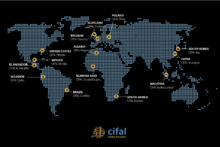CIFAL

The CIFAL Global Network, which is composed of 14 International Training Centres, forms a key part of the work of the United Nations Institute for Training and Research (UNITAR). The Network aims to serve as a training system of excellence for capacity building of government authorities and civil society leaders on sustainable development, as well as on global mandates and goals of the United Nations. Since its inception in 2003, the Network reaches more than 6,000 beneficiaries through over 60 training events every year.
The acronym CIFAL stands for "International Training Centre for Local Actors" (French: Centre International de Formation des Acteurs Locaux et Autorités Intervenant Localement or Spanish: Centro Internacional de Capacitación para Autoridades Locales).[1] Each CIFAL Centre is a hub for capacity building and knowledge sharing between local and regional authorities, national governments, international organisations, the private sector, and civil society.
Approach
The central purpose of CIFAL’s training programmes is to develop and strengthen human capacities to better respond to development challenges. CIFAL Centres rely on a facilitative approach that aims to:
- Facilitate the transfer of knowledge, experiences and best practices amongst government officials, private sector and civil society leaders
- Enhance capabilities to effectively perform relevant tasks
- Encourage cooperation and the development of multi-stakeholder partnerships
- Provide networking opportunities leading to city-to-city collaboration
- Contribute to the development of local and national strategies
Each of its learning and training activities present a variety of learning resources blending core content, assignments, tasks, assessments, peer-to-peer collaboration, interactive activities, and mentoring. Depending on the needs of the beneficiaries and the objectives of the training, activities are delivered in different formats: face-to-face, virtually, or blended, combining both.
Work
As of 2015, the CIFAL Global Network comprises 14 centres across Africa, Asia, Europe, and the Americas. Each CIFAL provides innovative training on key areas related to sustainable development and serves as hubs for the exchange of knowledge amongst government officials, non-governmental and international organizations, the private sector, civil society, academic institutions and the UN system.
Each CIFAL is specialized in thematic areas that are defined by the needs and priorities of the regions they serve. The thematic areas include:
- Urban Governance and Planning
- Economic Development
- Social Inclusion
- Environmental Sustainability
Their training programmes provide access to knowledge, resources and best practices, while promoting multi-stakeholder collaboration in support of sustainable development.
Citations
- ↑ "International Training Centre for Local Actors/Authorities". UNTERM. Retrieved 7 February 2015.
References
- GEN-Europe News. (Spring 2006) Ecovillages Build Bridges with Local Authorities. Denmark. Gaia Trust.
- Rollo, S. (23.9.06) Deal Signed to Create UN HUB at Scots ecovillage. Aberdeen. Press & Journal newspaper.
- UN-DCP. (2005) Capacity building for local authorities to achieve the Millennium Development Goals. Geneva. UNITAR.
- US Mayor Newspaper, June 27, 2005, Offerings of CIFAL Atlanta. Vol 72 Issue 11. Washington
External links
| ||||||||||||||||||||||||||||||||||||||||||||